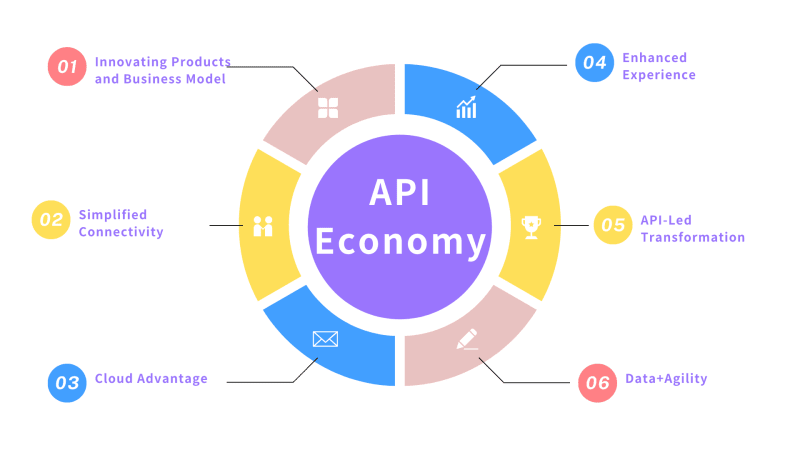The Rise of API Economy
API Economy, in simple terms, is the sum of economic activities based on Application Programming Interfaces (APIs). In today's rapidly evolving digital era, API Economy has become a key driver for innovation and growth in enterprises. With the proliferation of technologies like cloud computing, Internet of Things (IoT), and mobile internet, businesses are presented with unprecedented opportunities and challenges. To stand out in fierce market competition, enterprises need to actively embrace the API Economy, unlock the value of their data, and collaborate with partners and developers to create shared value.
In the digital age, API Economy serves as a crucial driver for innovation and growth in enterprises. As technologies like cloud computing, IoT, and mobile internet become more widespread, businesses face unprecedented opportunities and challenges. To distinguish themselves, enterprises must actively embrace API Economy, unlock the value of data, and collaborate with partners and developers to create shared value. API Monetization, open innovation, ecosystem building, systems interconnectivity, and digital transformation are key elements to achieve this goal.
Future Outlook of API Economy
API Economy presents a positive outlook for future development, driven by various factors.
Digital Transformation Drive: As businesses pursue digital transformation, the importance of API-based integration and software development grows. This enhances user experience and efficiency, leading to a continuous increase in the economic impact of APIs, presenting both opportunities and challenges to the industry.
Yilialinn marked this conversation as resolved.Widespread Adoption of Cloud Computing: Businesses and developers are increasingly using cloud platforms for building and deploying applications, accelerating development with convenient APIs. Cloud platforms also offer significant business opportunities for API markets by connecting different services, data, and devices.
Rapid Growth of IoT: The rapid development of the Internet of Things introduces substantial opportunities for the API industry. IoT devices require APIs for communication with the cloud, data transmission, collaboration, and intelligent control, supporting more sophisticated IoT applications.
Security Concerns: With the extensive use of APIs, security becomes a paramount concern. Ensuring the security of APIs, resisting various attacks such as data leaks, authentication, and authorization issues, is a crucial trend in the industry's future development.
Impact of Technological Innovations on API Security: Industrial upgrades and technological innovations drive the penetration of the internet into traditional industries, forming a complex API network. The rapid development of new technologies like IoT and apps brings traffic dominance to the internet but also poses IT challenges that need to be addressed.
Increasing Richness of API Service Products: With the rapid development of the digital economy, the growing demand for data applications from governments and enterprises propels the continuous expansion of the API service provider market.
The future of the API Economy holds immense growth potential, but careful consideration is required to address security issues and the impact of technological innovation.
Key Role of API Gateway in API Economy
API Gateway plays a pivotal role in the API Economy, ensuring the security and stable operation of APIs. Specific functions include, but are not limited to:
Security Protection: Preventing data leaks and unauthorized access through techniques such as authentication, access control, and data encryption.
Traffic Management: Ensuring the system maintains good performance even under high concurrency through techniques like load balancing and rate limiting.
Real-time Monitoring and Logging: Facilitating timely issue detection and ensuring the normal operation of services.
Integration and Interoperability: Enabling seamless communication and data exchange between different systems and services.
Support for Multiple Protocols and Formats: Meeting the diverse requirements of different systems, enabling smooth collaboration and integration.
Scalability and Flexibility: Adapting to evolving needs and market conditions.
Unified Management Interface: Facilitating quick viewing and management of all API resources by enterprises.
Support for Multiple Authentication and Authorization Methods: Ensuring that only authorized requests can access the corresponding resources, and different roles can only access their authorized resources.
Performance Optimization: Implementing measures to reduce system load and improve response speed, protecting the system from disruptions or service crashes.
Providing Documentation and Tool Support: Facilitating developers in rapid development and testing of API interactions.
In Conclusion
API Economy, as the sum of economic activities based on APIs, has become a crucial driving force for innovation and growth in enterprises in the digital era. In the backdrop of cloud computing, IoT, and mobile internet, businesses must actively embrace API Economy to unlock data value and collaboratively create value with partners. The future of API Economy will be influenced by trends such as digital transformation, widespread adoption of cloud computing, and rapid growth of IoT. However, it is essential to address challenges related to security and technological innovation. The API Gateway plays a key role in ensuring the security, stability, and functionality of APIs, providing reliable API service support to enterprises.







Top comments (0)
Some comments may only be visible to logged-in visitors. Sign in to view all comments.